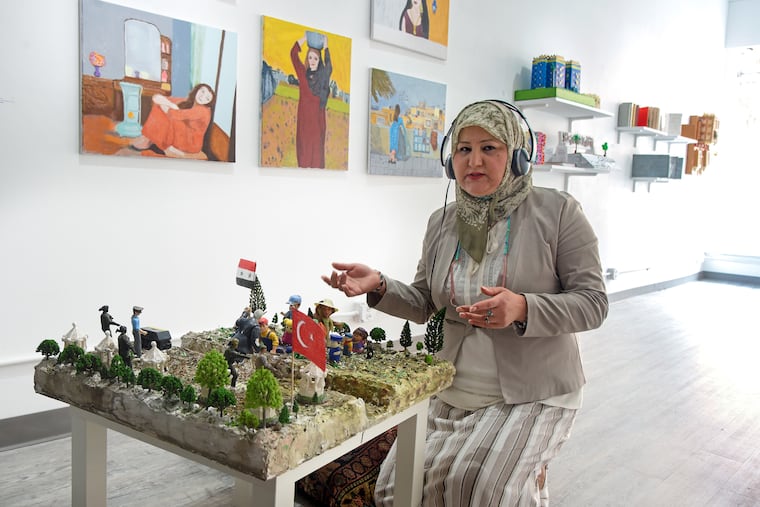‘Now, I’m from Philly!’: Iraqi refugee has found a new home and calling | We the People
“It’s not easy to make a decision to move to America, the country that my country was fighting."

Meet Fadaa Ali, an Iraqi refugee and U.S. citizen who’s sharing her stories through art.
• Filled by Philly: “I love Philadelphia. I feel like it’s like my city, Baghdad," she said. “I don’t feel homesick here."
• The tell-tale art: Ali’s son can tell when she’s thinking about her next art project because she gets very quiet. “He says, ‘You are going to create something,’ and I say, 'You are right!”
As Fadaa Ali talks about her life in Iraq and about the journey that brought her as a refugee to Philadelphia, there’s a phrase she repeats often in her thick Iraqi accent: “It’s not easy.”
“It’s not easy to learn English.”
“It’s not easy to make a decision to move to America.”
“It’s not easy to hear people when they are burned.”
After the windows of her home in Baghdad were blown out when the United States bombed the government building next door during its invasion of Iraq; after Ali heard the screams of people burning to death from the subsequent flames; after a group of Iraqi men held guns to her and her husband’s head because they wanted their car, Ali knew she he had to run.
She fled with her husband, two sons, and mother to Jordan in 2004.
The family spent five years there illegally, Ali said. Terrified her sons would be sent back to Iraq, Ali and her family accepted an offer to come to the U.S. as refugees in 2009.
“It’s not easy to make a decision to move to America, the country that my country was fighting,” Ali said. “So I’m scared. If I go to America, how’s people there? Will they fight with us? Will they like us?”
The family settled in an apartment building in Northeast Philly, where they still live. Within a month, Ali was taking English classes, and within two months, her husband got a job.
She said what surprised her most about Philly was the kindness people showed her, like the neighbor who stood in her front yard and held Ali’s hand as she cried after her mother’s death.
“She talk with me with love,” Ali, 49, said. “So I feel like all of Philly is like this lady.”
» MORE WE THE PEOPLE: At 94, she works 6 days a week at a Giant bakery
Ali worked at a day care for a time and went to school to be a pharmacy technician, but couldn’t land a job in the field. In 2018, she participated in Mural Arts’ Radio Silence project, which explored the Iraqi refugee experience.
From there, she was connected with the Friends, Peace, and Sanctuary project out of Swarthmore College, which uses art to share the stories of Syrian and Iraqi refugees and bring them closer to the communities in which they now live.
Ali — who hadn’t tried her hand at art since childhood, when she used to draw pictures of Mickey Mouse on her family’s flowers boxes in Baghdad — began sculpting, creating jewelry, and making books.
The first thing she constructed was a sculpture of the Great Mosque of Samarra in Iraq that she made with gypsum she bought from Home Depot.
“I have no idea if I’m doing it right or not. I said, ‘I will see if I am successful,’" she recalled. “So when I do it I am so happy. Oh my gosh. So happy!”
She also created books about her life in Iraq, and worked with a refugee from Syria, Amaal Alnajjar, to create a sculpture of Alnajjar’s escape across a three-meter trench from Syria into Turkey.
Ali used wood, foam, and gypsum as a base for that sculpture. For dirt, she used coffee. To symbolize the Syrian refugees, she used small dolls she found at flea markets, including Lego men, Happy Meal toys, and Playmobil figurines.
The sculpture is an exploration of the depths of human desperation and perseverance told through children’s toys. It is both childlike and complex, fascinating and unsettling.
“I am proud to make this art," Ali said.
» MORE WE THE PEOPLE: ‘You can make people happy,’ says accountant-turned-piano man
Ali’s work is on display at Twelve Gates Arts Gallery along with the work of other Friends, Peace, and Sanctuary artists. Additional exhibits of the project are also ongoing at City Hall and the Free Library’s Central Library branch on the Parkway. Ali also sells her work at craft shows and fairs around the city.
After 10 years in the U.S., Ali said she now thinks of herself as Iraqi and American. She considers herself something else, too — and when she proudly proclaims it, it’s the only time her accent completely disappears.
“Now, I’m from Philly!” she said.
Want more We the People?
• Neijae Graham-Henries is an 8-year-old aspiring barber from West Philly.
• Mackenzie Makatchie is a dog mom of nine Newfoundlands.
• Check out the full We the People archive here.